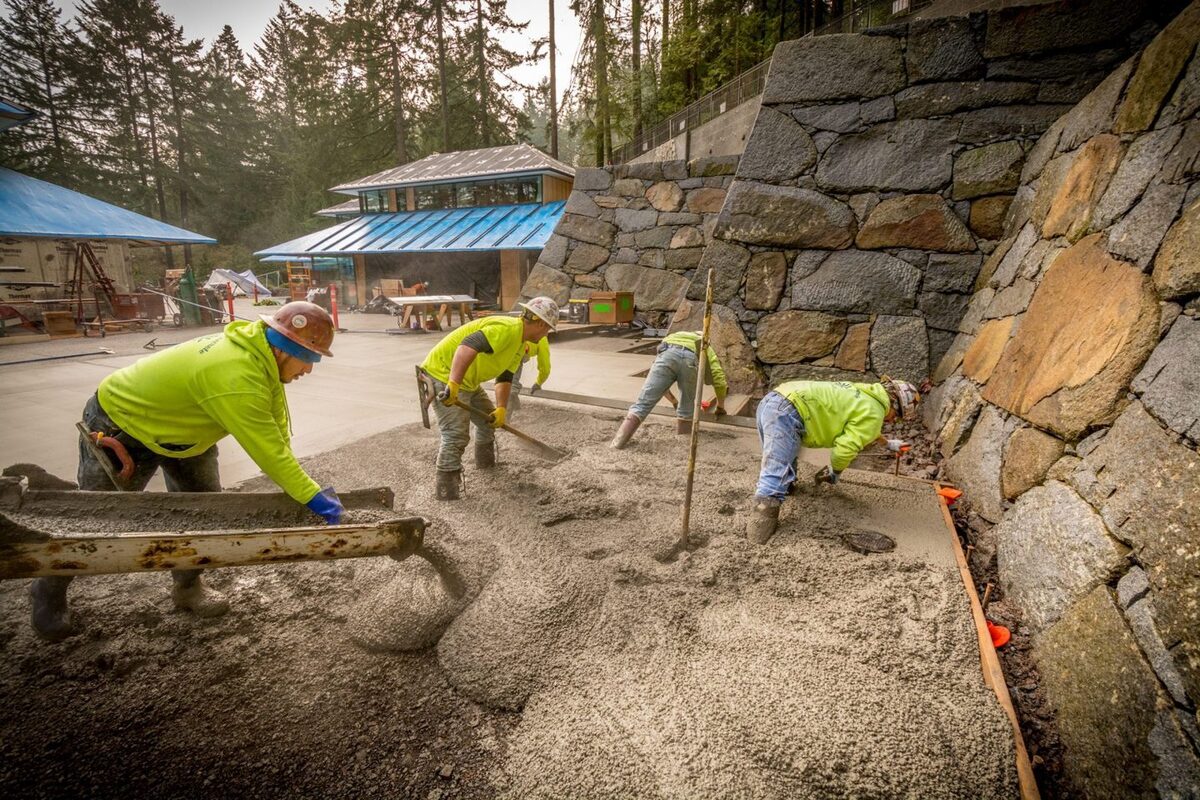Home>diy>Building & Construction>What Kind Of Jobs Can You Get With A Construction Management Degree


Building & Construction
What Kind Of Jobs Can You Get With A Construction Management Degree
Modified: October 20, 2024
Explore various career opportunities in the field of building construction with a construction management degree. Gain expertise in project management, site supervision, and cost estimation for a rewarding career in the industry.
(Many of the links in this article redirect to a specific reviewed product. Your purchase of these products through affiliate links helps to generate commission for Storables.com, at no extra cost. Learn more)
Introduction
Construction management is a dynamic and rewarding field that offers a wide range of job opportunities. With a construction management degree, individuals gain the necessary skills and knowledge to take on leadership roles in the construction industry. Whether you’re interested in managing projects, supervising construction sites, estimating costs, ensuring safety, or consulting on construction processes, a construction management degree can open doors to a variety of fulfilling careers.
In this article, we will explore the different types of jobs you can pursue with a construction management degree. From project management to facility and operations management, we will delve into the various roles and responsibilities associated with each job. So, if you’re considering a degree in construction management or are already a graduate in this field, read on to discover the diverse array of career paths that await you.
But before we dive into the specifics, let’s take a moment to understand the fundamental elements of a construction management degree program and the skills and knowledge it imparts.
Key Takeaways:
- A construction management degree opens up diverse career opportunities in overseeing projects, ensuring safety, managing costs, and promoting sustainability in the construction industry.
- Jobs in construction management require strong leadership, communication, and problem-solving skills, along with a deep understanding of construction processes and industry best practices.
Overview of Construction Management Degree
A construction management degree is designed to equip students with the skills and knowledge needed to effectively plan, coordinate, and manage construction projects. It combines elements of engineering, business, and project management to develop well-rounded professionals who can navigate the complexities of the construction industry.
The curriculum of a construction management degree program typically covers a wide range of subjects. Students learn about construction materials and methods, building codes and regulations, construction project planning and scheduling, cost estimation, risk management, and sustainable construction practices. They also gain a solid understanding of business and management principles, including finance, contracts, leadership, and communication.
In addition to classroom learning, many construction management programs also include hands-on experiences such as internships or co-op placements. These opportunities allow students to apply their knowledge in real-world construction projects, giving them valuable practical skills and industry connections.
Upon completion of a construction management degree, graduates are prepared to work in various sectors of the construction industry, including commercial, residential, industrial, and civil construction. They are well-equipped to take on responsibilities such as project management, site supervision, estimating and cost control, quality assurance, safety management, and facility and operations management. They can also pursue careers in consulting and business development, offering their expertise to clients and organizations in the construction field.
With a construction management degree, individuals have the foundation to not only excel in their chosen careers but also to adapt to the ever-evolving construction industry. The skills and knowledge gained through this program provide a solid platform for professionals to take on leadership roles, drive innovation, and contribute to the success of construction projects.
Now that we have an overview of what a construction management degree entails, let’s explore the different jobs that individuals can pursue in this field.
Skills and Knowledge Gained in a Construction Management Degree Program
A construction management degree program equips students with a comprehensive set of skills and knowledge needed to navigate the complexities of the construction industry. Here are some of the key areas in which graduates develop expertise:
- Construction Project Planning and Scheduling: Students learn how to create effective project plans, set realistic timelines, and manage project schedules. They gain knowledge of various scheduling techniques and software tools commonly used in the industry.
- Cost Estimation and Budgeting: Graduates acquire the skills to estimate construction costs accurately, develop project budgets, and perform cost control. They learn about different cost estimation methods, including quantity takeoffs, cost databases, and cost analysis.
- Construction Materials and Methods: Students gain an understanding of different construction materials, their properties, and their appropriate applications. They also learn about various construction methods and techniques, ensuring they have a solid foundation in building construction.
- Contract Management: Individuals learn about construction contracts and their legal implications. They gain knowledge of contract types, terms and conditions, and the process of contract administration. This helps them effectively manage contractual relationships with clients, subcontractors, and suppliers.
- Risk Management: Graduates develop the skills to identify, assess, and mitigate risks associated with construction projects. They learn how to develop risk management plans and ensure the overall safety and success of the project.
- Sustainable Construction Practices: With growing emphasis on sustainability in the construction industry, students learn about green building principles, energy efficiency, waste management, and environmental regulations. They gain the knowledge to incorporate sustainable practices into construction projects.
- Leadership and Communication: Effective leadership and communication skills are essential in the construction industry. Students learn how to lead construction teams, manage conflicts, and communicate effectively with various stakeholders, including clients, contractors, and regulatory agencies.
These are just some of the key skills and knowledge areas that students gain through a construction management degree program. The combination of technical, business, and interpersonal skills prepares graduates to excel in their chosen careers and adapt to the ever-changing demands of the construction industry.
Now that we have a grasp of the skills and knowledge gained in a construction management degree program, let’s explore the wide array of job opportunities available in this field.
Jobs in Construction Project Management
Construction project managers play a crucial role in overseeing the successful completion of construction projects, from start to finish. They are responsible for planning, organizing, and controlling all aspects of a project, including budgeting, scheduling, procurement, and ensuring quality and safety standards are met. With a construction management degree, individuals can pursue various job positions in the field of construction project management, including:
- Construction Project Manager: As a project manager, you will be responsible for the overall planning, coordination, and execution of construction projects. This includes managing project teams, coordinating with stakeholders, monitoring project progress, and ensuring that projects are completed on time, within budget, and according to specifications.
- Assistant Project Manager: In this role, you will support the project manager in all aspects of project planning and execution. This may involve assisting with budgeting, scheduling, subcontractor management, and document control. As you gain more experience, you may take on more responsibilities and eventually transition into a project manager role.
- Construction Project Coordinator: Project coordinators assist project managers in coordinating activities, resources, and information within a project. They may be responsible for maintaining project documentation, scheduling meetings, coordinating with subcontractors and suppliers, and tracking project progress.
- Construction Scheduler: As a scheduler, you will be responsible for developing and maintaining project schedules. This includes creating Gantt charts, determining activity durations, sequencing tasks, and updating schedules as changes occur. Effective scheduling is crucial to ensure projects stay on track and meet deadlines.
- Construction Contract Administrator: Contract administrators are responsible for managing the contracts and legal documents related to a project. They ensure compliance with contract terms, track contract changes, and handle documentation, such as requests for information (RFIs) and change orders.
These are just a few examples of the job positions available in construction project management. Depending on the size and complexity of the projects, there may be additional specialized roles, such as BIM (Building Information Modeling) manager, LEED (Leadership in Energy and Environmental Design) coordinator, or risk manager.
Construction project management roles require strong leadership, communication, and problem-solving skills. Project managers need to be able to navigate complex challenges, make decisions under pressure, and effectively communicate with diverse stakeholders. With a construction management degree and relevant experience, individuals can pursue rewarding career opportunities in construction project management.
Now, let’s dive into the jobs available in construction site supervision.
Jobs in Construction Site Supervision
Construction site supervisors play a critical role in ensuring that construction projects are executed efficiently and according to plan. They oversee the on-site operations, manage construction teams, and ensure that safety protocols are followed. With a construction management degree, individuals can pursue various positions in construction site supervision, including:
- Construction Site Supervisor: As a site supervisor, you will be responsible for overseeing all activities at the construction site. You will coordinate with subcontractors, monitor progress, ensure adherence to project plans and specifications, and address any issues that arise during construction.
- Assistant Site Supervisor: In this role, you will assist the site supervisor in managing day-to-day operations at the construction site. This may involve coordinating site resources, supervising workers, and conducting regular inspections to ensure quality and safety standards are met.
- Foreman: Foremen are responsible for supervising a specific trade or group of workers on a construction site. They coordinate tasks, assign work, and ensure that work is completed efficiently and in compliance with project requirements and schedules.
- Quality Control Inspector: Quality control inspectors play a crucial role in ensuring that construction work meets specified standards and requirements. They conduct inspections, perform tests, and document any deficiencies or non-compliance. They work closely with site supervisors and project managers to address quality issues and ensure that the final product is of high quality.
- Safety Officer: Safety officers are responsible for ensuring a safe working environment on construction sites. They develop and implement safety programs, conduct regular inspections, provide training to workers, and enforce safety regulations and best practices. Safety officers play a crucial role in preventing accidents and promoting a culture of safety.
Construction site supervision positions require individuals with strong leadership, communication, and problem-solving skills. Site supervisors need to have a deep understanding of construction methods, materials, and processes to effectively manage and coordinate on-site activities. They should also be well-versed in safety regulations and practices to ensure the well-being of workers and mitigate risks.
With a construction management degree and relevant experience, individuals can embark on fulfilling careers in construction site supervision. They have the opportunity to contribute to the successful completion of construction projects and make a significant impact on the built environment.
Next, let’s explore the jobs available in estimating and cost management.
Jobs in Estimating and Cost Management
Estimating and cost management are critical aspects of the construction industry. Professionals in these roles are responsible for accurately estimating project costs, managing budgets, and ensuring financial control throughout the construction process. With a construction management degree, individuals can pursue various positions in estimating and cost management, including:
- Construction Estimator: Estimators are responsible for accurately calculating the costs of construction projects. They analyze project plans and specifications, take off quantities, determine labor and material costs, and prepare cost estimates. Estimators play a crucial role in helping contractors bid on projects and make informed financial decisions.
- Cost Engineer: Cost engineers focus on developing and managing project budgets. They monitor project costs, track expenses, and identify areas of cost savings or potential cost overruns. Cost engineers work closely with project managers to ensure that projects are executed within budget constraints.
- Quantity Surveyor: Quantity surveyors specialize in assessing and managing construction costs. They estimate quantities of materials, perform cost analysis, and support the tendering process. Quantity surveyors play a key role in cost control, value engineering, and contract administration.
- Cost Consultant: Cost consultants provide independent cost advice to clients and organizations in the construction industry. They analyze project plans and specifications, prepare cost estimates, and provide recommendations on cost-effective construction methods and materials. Cost consultants assist clients in making informed financial decisions.
- Procurement Specialist: Procurement specialists are responsible for managing the procurement process for construction projects. They source materials and equipment, negotiate contracts with suppliers, and ensure timely delivery of materials to the construction site. Procurement specialists play a critical role in cost management and ensuring quality and timely project completion.
Estimating and cost management roles require individuals with strong analytical, numerical, and problem-solving skills. Professionals in these positions need to have a deep understanding of construction processes, materials, and market conditions to accurately estimate and manage project costs. They must also possess excellent communication and negotiation skills to interact with clients, suppliers, and other stakeholders.
With a construction management degree and relevant experience, individuals can pursue rewarding careers in estimating and cost management. They have the opportunity to contribute to the financial success of construction projects and play a key role in ensuring efficient resource allocation.
Next, let’s explore the jobs available in construction safety management.
Jobs in Construction Safety Management
Safety is of paramount importance in the construction industry, and construction safety managers play a crucial role in ensuring the well-being of workers and the prevention of accidents and injuries. With a construction management degree, individuals can pursue various positions in construction safety management, including:
- Construction Safety Manager: Safety managers are responsible for developing and implementing safety programs on construction sites. They analyze potential hazards, establish safety protocols and procedures, conduct safety training for workers, and ensure compliance with safety regulations. Safety managers play a critical role in creating a culture of safety and minimizing risks.
- Safety Inspector: Safety inspectors conduct regular inspections to identify safety hazards and ensure compliance with safety standards. They review construction sites, equipment, and processes, and provide recommendations for improvement. Safety inspectors play a proactive role in identifying and rectifying potential safety issues.
- Occupational Health and Safety Specialist: Occupational health and safety specialists focus on promoting a safe and healthy work environment. They assess workplace hazards, develop health and safety policies, conduct training programs, and investigate incidents. Occupational health and safety specialists play a critical role in ensuring the physical well-being of workers.
- Safety Coordinator: Safety coordinators assist safety managers in the implementation of safety programs and procedures. They support the development and communication of safety policies, maintain safety records, and assist in investigating incidents. Safety coordinators play a vital role in ensuring consistent adherence to safety protocols.
- Safety Trainer: Safety trainers develop and deliver training programs to educate construction workers on safety procedures and best practices. They ensure that workers are equipped with the knowledge and skills to work safely and identify potential hazards. Safety trainers play a key role in promoting a safety-conscious culture on construction sites.
Construction safety management positions require individuals with a strong understanding of safety regulations, hazard identification, and risk management. Professionals in these roles must have excellent communication and leadership skills to effectively communicate safety guidelines and promote safe work practices among construction workers.
With a construction management degree and relevant experience, individuals can pursue fulfilling careers in construction safety management. They have the opportunity to make a significant impact on the well-being of workers and foster a culture of safety within the construction industry.
Next, let’s explore the jobs available in construction quality management.
A construction management degree can lead to jobs such as project manager, construction manager, estimator, scheduler, and safety manager in the construction industry.
Jobs in Construction Quality Management
Ensuring quality is a crucial aspect of the construction process, and construction quality managers play a vital role in maintaining and improving the quality of construction projects. With a construction management degree, individuals can pursue various positions in construction quality management, including:
- Construction Quality Manager: Quality managers are responsible for implementing and maintaining quality control systems on construction projects. They develop quality assurance plans, conduct inspections and audits, and ensure compliance with quality standards and specifications. Quality managers play a critical role in identifying and addressing quality issues to deliver projects of the highest standards.
- Quality Control Inspector: Quality control inspectors assess construction work to ensure that it meets specified quality standards. They inspect materials, conduct tests, verify compliance with plans and specifications, and maintain quality control documentation. Quality control inspectors play a crucial role in identifying and rectifying quality issues before they impact the final product.
- Quality Assurance Engineer: Quality assurance engineers focus on the overall quality management of construction projects. They develop quality control procedures, analyze data to identify trends and areas for improvement, and implement corrective and preventive actions. Quality assurance engineers play a key role in continuous improvement and the implementation of best practices.
- Quality Auditor: Quality auditors assess the effectiveness of quality management systems and procedures. They conduct audits, review quality control documentation, and identify areas for improvement. Quality auditors help ensure that construction projects adhere to quality standards and meet client expectations.
- Quality Coordinator: Quality coordinators assist in the coordination and implementation of quality control processes. They ensure that quality control procedures are followed, maintain quality records, and provide support to quality managers or project teams. Quality coordinators play a vital role in maintaining consistent quality standards throughout the construction project.
Construction quality management positions require individuals with a keen eye for detail, a strong understanding of construction methods and materials, and a dedication to ensuring excellence. Professionals in these roles must have excellent communication and analytical skills to effectively identify and address quality issues and collaborate with project teams to implement quality improvement measures.
With a construction management degree and relevant experience, individuals can pursue rewarding careers in construction quality management. They have the opportunity to contribute to the delivery of high-quality construction projects and ensure client satisfaction.
Next, let’s explore the jobs available in sustainable construction management.
Jobs in Sustainable Construction Management
Sustainable construction is becoming increasingly important in today’s world, and professionals in sustainable construction management play a key role in implementing environmentally-friendly practices in the construction industry. With a construction management degree, individuals can pursue various positions in sustainable construction management, including:
- Sustainable Construction Manager: Sustainable construction managers are responsible for overseeing and implementing sustainable practices on construction projects. They develop and execute sustainability plans, ensure compliance with green building certifications and standards, and promote sustainable construction methods and materials.
- LEED Coordinator: LEED (Leadership in Energy and Environmental Design) coordinators focus on managing LEED certification processes for construction projects. They guide project teams in meeting LEED requirements, facilitate documentation, and ensure adherence to sustainable design and construction principles.
- Sustainability Consultant: Sustainability consultants provide expert advice and guidance on sustainable construction practices. They analyze project plans and specifications, conduct sustainability assessments, and recommend strategies for optimizing energy efficiency, water conservation, waste management, and other sustainable measures.
- Green Building Specialist: Green building specialists focus on incorporating green building principles and strategies into construction projects. They research and recommend sustainable materials and technologies, collaborate with architects and engineers on sustainable design, and monitor the implementation of green building practices.
- Sustainability Analyst: Sustainability analysts assess the environmental impact of construction projects and identify opportunities for improvement. They analyze data, conduct life cycle assessments, and provide recommendations for reducing energy consumption, carbon emissions, and waste generation.
Professionals in sustainable construction management roles must have a strong understanding of green building practices, sustainable design principles, and environmental regulations. They should stay updated with advancements in sustainable construction and possess excellent analytical and problem-solving skills to identify and implement sustainable solutions.
With a construction management degree and a passion for sustainability, individuals can pursue fulfilling careers in sustainable construction management. They have the opportunity to drive positive change in the construction industry and contribute to a more environmentally-conscious built environment.
Next, let’s explore the jobs available in facility and operations management.
Read more: How To Get A Job In Construction
Jobs in Facility and Operations Management
Facility and operations management play a crucial role in the efficient functioning of construction projects, ensuring that facilities are well-maintained and operations run smoothly. With a construction management degree, individuals can pursue various positions in facility and operations management in the construction industry, including:
- Facility Manager: Facility managers are responsible for the overall operation and maintenance of construction facilities, including buildings, equipment, and infrastructure. They oversee maintenance activities, manage contractors, and ensure that facilities meet safety, security, and regulatory requirements.
- Operations Manager: Operations managers oversee the day-to-day operations of construction projects. They manage resources, coordinate with contractors and suppliers, ensure compliance with project plans and schedules, and address any operational issues that may arise. Operations managers play a key role in optimizing project efficiency and productivity.
- Asset Manager: Asset managers focus on managing the lifecycle of assets within construction projects. They develop asset management plans, monitor asset performance, oversee maintenance and repair activities, and make informed decisions regarding asset acquisition, utilization, and disposal. Asset managers play a critical role in optimizing resource allocation and maximizing asset value.
- Inventory Manager: Inventory managers are responsible for managing and controlling construction project inventory, including materials, equipment, and supplies. They develop inventory control procedures, track inventory levels, coordinate with procurement teams, and ensure the availability of necessary resources while minimizing excess inventory.
- Operations Coordinator: Operations coordinators provide support to operations managers in coordinating activities, managing schedules, and facilitating communication between teams. They may be responsible for managing project documentation, tracking progress, and assisting in the resolution of operational issues.
Professionals in facility and operations management roles must have strong organizational, communication, and problem-solving skills. They should possess a keen attention to detail and the ability to multitask, as they are responsible for managing various aspects of project facilities and operations.
With a construction management degree and relevant experience, individuals can pursue rewarding careers in facility and operations management. They have the opportunity to contribute to the efficient operation of construction projects and ensure that facilities are well-maintained and operations run seamlessly.
Next, let’s explore the jobs available in construction consulting.
Jobs in Construction Consulting
Construction consulting is a specialized field that involves providing expert advice and guidance to clients and organizations in the construction industry. With a construction management degree, individuals can pursue various positions in construction consulting, offering their expertise and insights to help clients make informed decisions and overcome challenges. Some of the job opportunities in construction consulting include:
- Construction Consultant: Construction consultants provide strategic advice and guidance to clients on various aspects of construction projects. They assess project feasibility, analyze risks, evaluate cost and schedule estimates, and recommend solutions to optimize project outcomes. Construction consultants play a crucial role in guiding clients through the complex process of construction project planning and execution.
- Design Consultant: Design consultants specialize in providing innovative design solutions and recommendations to clients. They collaborate with architects, engineers, and contractors to develop project designs that meet client requirements, maximize functionality, and optimize construction efficiency. Design consultants use their expertise to enhance the architectural and design aspects of construction projects.
- Sustainability Consultant: Sustainability consultants focus on advising clients on sustainable construction practices. They evaluate project designs and construction processes to identify opportunities for energy efficiency, waste reduction, and environmentally-friendly practices. Sustainability consultants help clients incorporate sustainable strategies into their projects, promoting environmental stewardship and long-term sustainability.
- Project Management Consultant: Project management consultants assist clients with the successful execution of construction projects. They provide guidance on project planning, risk assessment, scheduling, budgeting, and resource allocation. Project management consultants help clients optimize project performance, improve project outcomes, and mitigate potential risks and challenges.
- Contracting Consultant: Contracting consultants specialize in advising clients on contractual matters throughout the construction process. They review contracts, provide guidance on contractual obligations and terms, and help resolve disputes or conflicts. Contracting consultants ensure that clients navigate the complexities of construction contracts effectively, minimizing potential legal issues.
Professionals in construction consulting roles must have strong analytical, problem-solving, and communication skills. They should possess a deep understanding of construction processes, industry trends, and best practices to offer valuable insights and recommendations to clients.
With a construction management degree and relevant experience, individuals can pursue fulfilling careers in construction consulting. They have the opportunity to work with a variety of clients, contribute their expertise to diverse construction projects, and make a significant impact on the success of those projects.
Now, let’s explore the jobs available in construction business development and sales.
Jobs in Construction Business Development and Sales
Construction business development and sales professionals play a crucial role in expanding the client base, promoting construction services, and driving revenue growth for construction companies and organizations. With a construction management degree, individuals can pursue various positions in construction business development and sales, helping companies thrive in a competitive market. Some of the job opportunities in this field include:
- Business Development Manager: Business development managers are responsible for identifying new business opportunities and fostering relationships with potential clients. They conduct market research, develop sales strategies, collaborate with marketing teams, and pursue new leads. Business development managers play a key role in growing the client base and driving the company’s revenue.
- Sales Manager: Sales managers oversee the sales team and are responsible for achieving sales targets and objectives. They develop sales strategies, manage client relationships, negotiate contracts, and provide guidance and support to the sales team. Sales managers play a critical role in driving sales growth and ensuring client satisfaction.
- Account Manager: Account managers build and maintain relationships with existing clients, ensuring client satisfaction and identifying opportunities for upselling and cross-selling. They understand client needs, provide solutions, and coordinate with internal teams to deliver on client requirements. Account managers play a crucial role in nurturing client relationships, driving repeat business, and fostering customer loyalty.
- Proposal/Bid Manager: Proposal or bid managers are responsible for preparing and submitting proposals in response to client inquiries or tenders. They coordinate with various departments within the organization to gather relevant information and develop compelling proposals that address client needs and requirements. Proposal managers play a vital role in securing new contracts and projects for the organization.
- Marketing Coordinator: Marketing coordinators support the business development and sales efforts by coordinating marketing activities, developing promotional materials, and managing digital marketing campaigns. They assist in the creation of marketing strategies, analyze market trends, and support lead generation initiatives. Marketing coordinators play a key role in increasing brand awareness and attracting potential clients.
Professionals in construction business development and sales roles must have strong interpersonal, communication, and negotiation skills. They should possess a customer-centric mindset and a deep understanding of the construction industry to effectively promote construction services and meet client needs.
With a construction management degree and relevant experience, individuals can pursue rewarding careers in construction business development and sales. They have the opportunity to drive the growth and success of construction companies by expanding the client base, fostering client relationships, and generating revenue.
Now that we have explored various jobs in construction, let’s summarize what we have discussed.
Conclusion
A construction management degree opens up a world of opportunities in the construction industry. With the skills and knowledge gained through this program, individuals can pursue a wide range of rewarding careers that encompass various aspects of construction management.
In this article, we explored different job roles that individuals with a construction management degree can pursue. From construction project management to facility and operations management, estimating and cost management, safety management, quality management, sustainable construction, construction consulting, and business development and sales, there is a diverse array of career paths to choose from.
Each job role comes with its own unique set of responsibilities and requirements. However, all of these roles require strong leadership, communication, problem-solving, and analytical skills. Professionals in these positions must possess a deep understanding of construction processes, regulations, and industry best practices. They must also stay updated with the latest technological advancements and industry trends to remain competitive in the field.
Whether your passion lies in overseeing construction projects, ensuring safety and quality standards, implementing sustainable practices, or advising clients on construction-related matters, a construction management degree provides you with the foundation and knowledge to excel in your chosen career.
As you embark on your journey in the construction industry, remember to continuously learn and adapt to the ever-changing landscape. Seek opportunities to expand your skills, stay updated with industry advancements, and network with professionals in the field. This will not only enhance your career prospects but also contribute to the growth and success of the construction industry as a whole.
With determination, expertise, and a commitment to excellence, you can make a significant impact in the construction industry and contribute to the creation of remarkable structures that shape our built environment.
Good luck on your path to a fulfilling and successful career in construction management!
Frequently Asked Questions about What Kind Of Jobs Can You Get With A Construction Management Degree
Was this page helpful?
At Storables.com, we guarantee accurate and reliable information. Our content, validated by Expert Board Contributors, is crafted following stringent Editorial Policies. We're committed to providing you with well-researched, expert-backed insights for all your informational needs.














0 thoughts on “What Kind Of Jobs Can You Get With A Construction Management Degree”